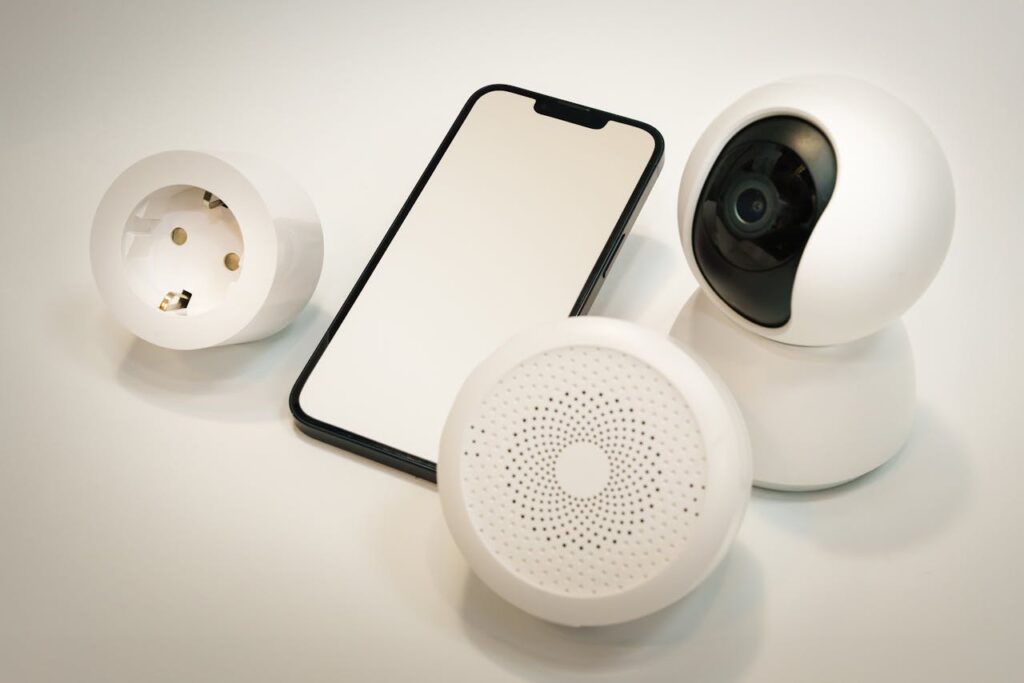
The Internet of Things (IoT) and Industry 4.0 are two concepts revolutionizing the manufacturing industry.
These terms are often used interchangeably but have different meanings and applications.
This article will explore the difference between Industry 4.0 and IoT, their benefits, and their impact on the manufacturing industry.
NOTE: In this article, I’ll interchangeably use the terms Internet of Things (IoT) and Industrial Internet of Things (IIoT) because they are synonymous. The only difference is that while IoT has applications in automotive, smart homes, wearables, and more industries, IIoT refers more specifically to IoT applied to industrial applications like manufacturing and energy.

The Industrial Internet of Things (IIoT) integrates internet-connected devices and sensors with traditional industrial machinery and equipment.
This integration allows for real-time monitoring and data collection, which can be used to optimize the performance of the machinery and improve overall efficiency.
One of the key benefits of IIoT is predictive maintenance.
By using sensors to monitor machinery, manufacturers can detect and diagnose problems before they lead to downtime or failure. This allows for proactive maintenance and repairs, significantly reducing downtime and improving overall equipment effectiveness (OEE).
IIoT also allows for increased automation and remote monitoring.
With internet-connected devices, manufacturers can automate processes and monitor production from a central location, reducing the need for manual labor and increasing overall efficiency.
Another advantage of IIoT is improved quality control.
With real-time data collection and analysis, manufacturers can detect quality issues early in production and adjust before the product is completed. This can lead to higher quality products and reduced waste.
Industry 4.0 is a broader concept that integrates advanced technologies into manufacturing. It includes IIoT and other technologies such as artificial intelligence, robotics, and 3D printing.
One of the key benefits of Industry 4.0 is the ability to create a smart factory.
Manufacturers can create a highly automated and flexible production environment by integrating advanced technologies and data analytics. This allows for rapid product customization and adaptation to changing market demands.
Another advantage of Industry 4.0 is improved supply chain management. With real-time data analytics, manufacturers can optimize the entire supply chain, from raw materials to finished products. This can reduce costs, improve delivery times, and increase customer satisfaction.
Industry 4.0 also enables new business models, such as product-as-a-service and mass customization. With advanced technologies and data analytics, manufacturers can offer customized products and services to individual customers, increasing revenue and customer loyalty.
When discussing the difference between Industry 4.0 and IoT, it’s important to remember that while both involve integrating advanced technologies into manufacturing, the two concepts have some key differences.

Firstly, IIoT focuses more on integrating internet-connected devices and sensors with traditional industrial machinery and equipment. This allows for real-time monitoring and predictive maintenance but does not necessarily involve integrating other advanced technologies, such as artificial intelligence and robotics.
On the other hand, Industry 4.0 is a more comprehensive concept integrating a wide range of advanced technologies. These include IIoT and artificial intelligence, robotics, and 3D printing technologies.
Another key difference between Industry 4.0 and IoT is that IoT focuses on improving the performance and efficiency of existing machinery and equipment. It primarily aims to reduce downtime, increase automation, and improve quality control.
Industry 4.0, on the other hand, is more focused on creating a highly flexible and adaptable production environment and integrating advanced technologies to create a smart factory that can quickly adapt to changing market demands and customer needs.
The final difference between Industry 4.0 and IoT is that IoT focuses more on the manufacturing process, while Industry 4.0 focuses more on the entire supply chain. Industry 4.0 involves the integration of advanced technologies to optimize the entire supply chain, from raw materials to finished products.
The difference between Industry 4.0 and IoT becomes more pronounced as the technological landscape evolves, especially in their forward trajectories.
While IoT started as a system for connecting devices to the internet for data collection, Industry 4.0 envisions a future where these devices are part of an interconnected cyber-physical system. The next phase involves the integration of AI and machine learning, where predictive maintenance and self-optimizing systems drive efficiency.
In the future, the difference will hinge on the broader automation and intelligence within Industry 4.0 ecosystems.
Wherever this goes, it is an exciting time for manufacturers everywhere.
There is a brief overview of the difference between Industry 4.0 and IoT. Knowing the difference between the two matters is important because as you work to digitalize your factory, you might hear these terms discussed here or there.
As you hear them discussed at your factory, knowing the difference will help you better understand what changes are coming and/or effectively communicate those changes to people who need to know about it.